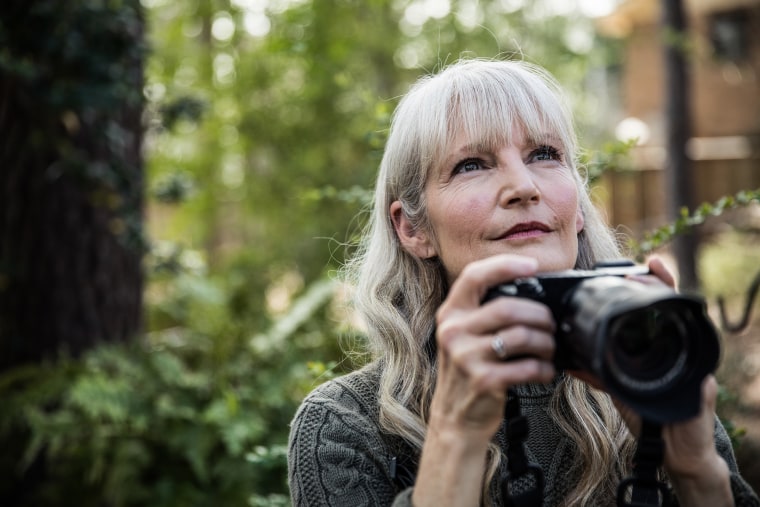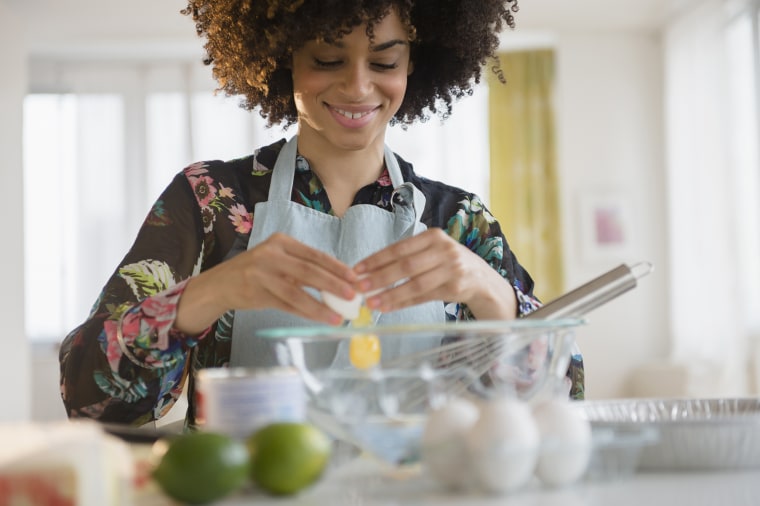In today’s world, it can be easy to forget to prioritize our own well-being. One of the best ways to take inventory of your needs?Spending time alone. While it may seem counterintuitive in the moment, this time allows us to be better to ourselves and the people around us.
Although you may have a solid support system around you, learning how to be happy alone is a journey that most will travel throughout their lives. Luckily, the practice of finding contentment in the small moments is something that can be practiced every day.
Whether you are new to the solo movement or you are a journaling expert, there are so many ways to get in touch with your inner being and practice self-love. With the help of experts, TODAY was able to compile some helpful tips and tricks to figure out how to best spend your time alone.
Stop comparing yourself to others.
When scrolling through social media, it’s easy to lose sight of who you really are — and what sets you apart. Kathryn Lee, MHC, warns that social media can often lead to comparison, aka “the thief of joy.”
“Comparing yourself to others can make you feel inadequate, less than, and left out potentially leading you to experience higher levels of stress, anxiety, or low self-esteem,” she said.
If you find yourself feeling down, stop scrolling and remember that we are all on different paths. According to Lee, the best way to get out of this negative headspace is to practice acceptance and cut out any of the emotional triggers like Instagram or Facebook.
Get clear about what you want.
While it seems simple, it is easy to forget to set your intentions in this process. What do you want to gain from spending time alone? In what ways do you want to see yourself develop? Creating a plan allows us to cope with the uncertainty of the future and relax our nervous systems.
“We need to really spend that time exploring our ‘NWDVs,’” says Susan Zinn, LPCC. “What are our needs, wants, desires and values and how do we wanna feel every single day? So really being intentional.”
Develop a morning routine.
No one wants to hear it, but waking up a little bit earlier to give ourselves the chance to take in the day is important. While it is so easy to wake up and immediately check messages, we should not be looking at our phones for the first hour of the day. It is also necessary to get body movement in early. A little bit of sunlight and walking outside have been proven to reduce cortisol levels.
Zinn says, “There’s a practice of actually waking up first thing in the morning and within the first 30 minutes [of your day], getting direct sunlight and walking for roughly about 20 minutes.”
Be intentional about your screen time.
While there are many negative effects of social media, it can also be used as a tool that allows us to learn more about subjects that we care about with like-minded individuals. Whether you want to learn more about global warming and the effects that it has on the planet or you want to find a new recipe to enjoy, social media can make resources feel more accessible.
“[S]ocial media can be a great aggregator of amazing people doing things,” Zinn says. “So being selective of the people that you’re following — not just because you’re friends with them, but because they are people that are actually making you feel good when you’re seeing their feed every day — is super important.”
Develop a workout routine.
Have you ever noticed how your mood improves after a brisk walk around the block? It's no secret that a simple walking routine is beneficial for your health. In addition to lowering cholesterol levels and blood pressure, walking — either fast or slow — helps relieve stress and increase mindfulness, according to research.
“On the biological level, the endorphins that get released from exercising improve mood. Psychologically, the more you engage and the better you get, that sense of mastery increases confidence and self-esteem, which leads to feeling happier," says Dr. Nina Vasan, MD, Chief Medical Officer at Real.
It's even better when you can take your workout outdoors, "as time spent in nature also helps to improve mood."

Curate hobbies.
Your career, family and everyday commitments keep you busy enough as it, but what do you do for you? Dr. Vasan recommends revisiting an old hobby or finding a new one that sparks joy. Go for something that stimulates creativity like taking up photography or signing up for a ceramics course.
Volunteer in your community.
Helping others does your heart — and head — some good. A 2020 study published in the Journal of Happiness found that people who volunteer are happier than those who don't.
"Volunteering and giving back helps you find a sense of purpose. By identifying a cause you care about and giving your time to that, you get connected to something beyond yourself, and that can increase your sense of happiness,” Dr. Vasan says.

Connect to the micro-moments of joy.
It can often feel like we are constantly waiting for big events or moments to be happy. Joy can be found every day in the small experiences that we have. Be intentional about looking for beauty and positivity as much as possible. Not only will we find little bits of joy, but it also reminds us how we want to feel on a day-to-day basis.
Zinn also reminds us that we can be a source of joy in the lives of others when we cannot see it in our own lives.
“When [clients] are having a hard time feeling grateful for their lives, [...] I invite them to actually start when they go about their lives,” said Zinn. “Every time you [interact with] a salesperson and they have their name tag, rather than just saying thank you, actually say, ‘Thank you, John. I appreciate you.’”
Practice self-reflection.
Much like looking into a physical mirror, self-reflection is a simple way to gain insight into what you look like — from the inside out.
Dr. Vasan suggests activities like journaling, practicing mindfulness and expressing gratitude to help you better understand who you are and what you need. In return, you’ll be able to connect with others on a deeper level.
Practice “Heartfulness.”
For someone who struggles to meditate, mindfulness is not always the best solution. Zinn suggests the alternative of focusing on what we are letting flow through our hearts before it gets to our minds. This practice allows us to gain a new perspective on our situation without being toxically positive. Through heartfulness, people are able to look at not just what they want from life, but how they want to feel on a day-to-day basis.
Be bold and try new things.
Remember when you tried kale for the first time and actually liked it? Of course it can be daunting, but trying new things can open up a a whole new world for you.
Come up with a list of things you've always wanted to try, from daring foods to out-of-the-ordinary activities. One by one, check the items off your list and discover a few favorites along the way.
Lean on animals for emotional support.
All pet parents know that they're never truly alone — as long as they have their fur baby by their side. Dr. Vasan couldn't agree more: "Emotional support animals can bring immense joy and companionship to people.”
If you think having your pup or cat with you would help on your solo journey, then Dr. Vasan recommends reaching out to your doctor to see if you can register your pet as an emotional support animal. That way, "you can take them in certain places related to housing and travel.”
Put yourself first.
Although it's often easier said than done, Lee suggests carving out time to really get to know yourself. After all, "the most important relationship we have is the relationship with our own selves."
Treat the relationship with yourself like any other relationship in your life by prioritizing your wants and needs. Maybe that means scheduling daily workouts, reading daily affirmations or setting aside five minutes a day to jot down your thoughts. By filling your own cup, you'll have the space and energy for everyone else.
Related: The importance of being selfish

Get out in nature.
Research shows that time spending time outside leads to a more happy, relaxed state. For example, a 2019 study published in Scientific Reports found that spending at least 120 minutes in nature each week improved people's health and overall wellbeing.
Lee adds that fresh air and sunshine can lower cortisol levels, blood pressure, heart rate and overall stress. Stepping out in nature also clears the mind, ultimately leading to improved working memory, cognitive flexibility and attentional control.
In other words, you'll become one with yourself by becoming one with nature.
Live in the moment.
So many times we save life's little luxuries — pricey candles, baked goods, you name it — for special occasions. But experts agree that the true secret to being happier alone is doing your best to live your best life 365 days of the year. "Don’t wait for someone, something, or a milestone to dictate your happiness,” Lee says. "You have the agency to create a life full of joy and abundance."
Take this as your permission to light all the candles, bake all the cakes and do whatever makes your heart happy.
Be kind to yourself.
Our experts add that it's important to remember that you are your own best friend. Try your best to meet yourself where you are and understand that your journey to becoming happy alone will be different than the people around you.
“You will talk to yourself more than any other single person on the entire planet for the rest of your life,” Zinn says. “I think that happiness really begins with yourself. You have to become your own best friend and nurture a loving relationship with yourself in order for you to find contentment, fulfillment and enjoyment in your life.”









